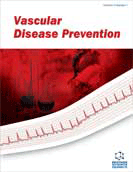Abstract
Estrogen has been reported to reduce mortality from coronary heart disease (CHD) and other cardiovascular disease. According to the Heart and Estrogen / Progestin Replacement Study (HERS) and the Womens Health Initiative (WHI), however, hormone therapy such as estrogen plus medroxyprogesterone acetate (MPA) increased the risk of cardiovascular disease in postmenopausal women with or without CHD. This evidence suggests that the addition of MPA may offset the favorable effects of estrogen on atherosclerosis in postmenopausal women. We previously demonstrated that conjugated equine estrogen (CEE) increased plasma high-density lipoprotein (HDL) cholesterol concentrations and flow-mediated vasodilation in the brachial artery, representing endothelium-dependent vasodilation. The addition of MPA, however, reversed estrogens beneficial effects in a concentration dependent manner. In contrast, MPA also favorably affects vascular inflammatory markers. MPA decreases CEE-induced increases in vascular inflammatory markers such as plasma C-reactive protein (CRP) and amyloid A protein concentrations. In addition, MPA-induced reduction in CRP appears to preserve estrogens favorable effect on cell adhesion molecules. Thus, MPA seems to have both adverse and beneficial effects on the risk of CHD. Recent findings of WHI, however, demonstrated that estrogen alone did not increase the overall risk of CHD in postmenopausal women without CHD. This indicates that MPA administration may adversely affect on the risk of CHD in healthy postmenopausal women. However, it is possible to speculate that the anti-inflammatory effect of MPA can reduce the risk of CHD in subjects with vascular inflammation. Further studies are needed to investigate these issues.
Keywords: estrogen replacement therapy (ert), low-density lipoprotein (ldl), coronary heart disease (chd), progestins, endothelial function, Nitric oxide (no), atherosclerosis


